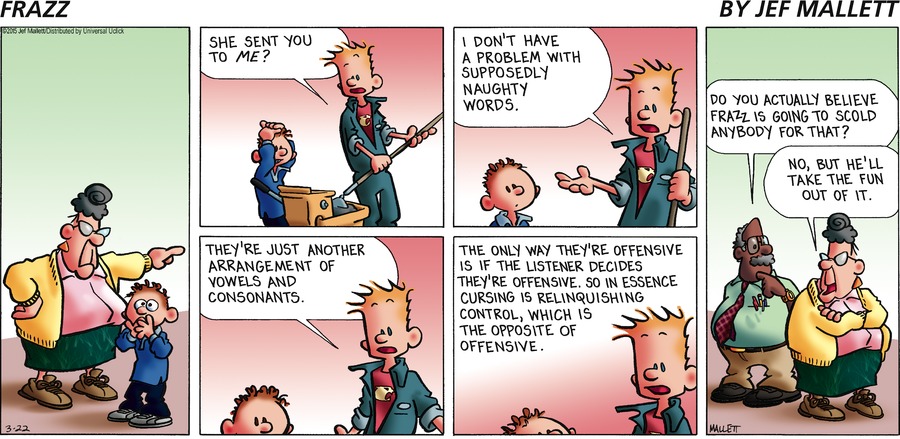Archive for March, 2015
A Sino-English grammatical construction
As I was preparing a recent post comparing Pekingese and Modern Standard Mandarin (MSM) sentences, I encountered an unusual (to me) expression that, at first, I didn't know how to interpret, namely "笑CRY". The two morphemes (pronounced "xiàoCRY", one Chinese and one English, mean "laugh" and "cry".
Read the rest of this entry »
A succor born every minute
Great news (if you're a pompous idiot)! There is news from the UK's Daily Mail of an app that will ruin your SMS messages and make you sound like someone who went through a matter transporter with a thesaurus!
So in case you should want to completely wreck your chances of ever getting another date with anyone normal, the Mail's screenshots show that the app will replace "Hey!" in your texts by "Salutations!"; it will replace "help me with my homework" by "succor me with my homework"; "smart girl" will be changed to "luminous girl"; "meet at my place" will become "meet at my residence"; "sounds good" will come out as "sounds euphonic"; and "have a good time" will morph into "have a congenial time".
Read the rest of this entry »
Permalink Comments off
Awful book, so I bought it
A long time ago (it was 2010, but so much has happened since then) I noted here that Greg Mankiw recommended to his Harvard economics students not just the little book I hate so much (The Elements of Style), but also William Zinsser's book On Writing Well. About the latter, I said this:
I actually don't know much about Zinsser's book; I'm trying to obtain a copy, but it is apparently not published in the UK. What I do know is that he makes the outrageous claim that most adjectives are unnecessary. So I have my doubts about Zinsser too.
Well, last Thursday, as I browsed the University of Pennsylvania bookstore (I'm on the eastern seaboard in order to give a lecture at Princeton on Monday), I spotted that a copy of the 30th anniversary edition of Zinsser was on sale at the bargain price of $8.98. Should I buy it? I flipped it open by chance at page 67: "Use active verbs unless there is no comfortable way to get around using a passive verb…" Uh-oh! More passivophobia. I've definitely got a professional interest in hatred of passives.
I turned the page and saw "ADVERBS. Most adverbs are unnecessary" and "ADJECTIVES. Most adjectives are also unnecessary." Of course! I remember now that I tried to skewer this nonsense in "Those who take the adjectives from the table", commenting on a quotation from Zinsser in a book by Ben Yagoda. Zinsser only uses five words to say "Most adjectives are also unnecessary," but one of them (unnecessary) is an adjective, and another (also) is an adverb.
Read the rest of this entry »
Permalink Comments off
Schlump season
When I was a student at Dartmouth (1961-1965), from around mid-December to mid-March, we had roughly three feet of snow on the ground much of the time, but then came the big melt, and we called it the "schlump" season. The paths across campus were so muddy that the buildings and grounds crew placed "duck boards" on the ground for us to walk on.
Read the rest of this entry »
Coherence award for Stephen King
Jan Freeman, "Stephen King scores a grammar win", Throw Grammar from the Train, 3/20/2015:
Stephen King, novelist and resident of Maine and (sensible man!) Florida, has refuted the Maine governor’s claim that King had left the state to escape oppressive taxes.
"Governor LePage is full of the stuff that makes the grass grow green," the best-selling author told a local radio station. "Tabby and I pay every cent of our Maine state income taxes, and are glad to do it. We feel, as Governor LePage apparently does not, that much is owed from those to whom much has been given."
For me, that boldface sentiment is the news here: In its long quotation history, it has rarely been rendered grammatically. “From whom much is given, much is expected” – from John F. Kennedy Jr. — is just one mangled example. You'd think a Bible quotation would get some respect, but it turns out the human mind has a hard time supplying the right number of prepositions and pronouns to say what this maxim intends.
Read the rest of this entry »
"DNA-based prediction of Nietzsche's voice"
An interesting paper was recently brought to my attention: Flavia Montaggio, Patricia Montaggio, & Imp Kerr, "DNA-based prediction of Nitzsche's voice", Investigative Genetics, Spring 2015. The abstract is pretty good:
This paper presents a protocol for the accurate prediction of an individual’s voice based on genotype data, specifically from single nucleotide polymorphisms (SNPs). We collected trace amounts of cellular material (Touch DNA) from books that belonged to the philosopher Friedrich Nietzsche (1844-1900). DNA was extracted and amplified using DOP-PCR technique. Five different genomic DNAs were generated. Nietzsche’s genotype was singled out after comparison to genotype data from one living relative of the Nietzsche family. Nietzsche’s genotype data was analyzed using a DNA-based phenotyping assay, termed VoiceRator, that incorporates the 24 most informative voice SNPs based on their association with genes related to the phenotypic expression of the vocal tract and larynx structure and function. An SNP-based voice profile of Nietzsche was inferred. The profile data was converted into bio-measures that were used to 3D-print a vocal tract and larynx through which phonation was organically generated. A composite of seven Text-to-Speech simulations was made using a sound morphing software. The result is presented in audio format and illustrates the first attempt at simulating the voice of a deceased person.
Read the rest of this entry »
More on "duang"
A couple of weeks ago, we had an extensive discussion of Jackie Chan's famous expostulation about the wondrous effect of his shampoo that went viral on the Chinese internet.
Read the rest of this entry »
Crash blossom roundup
"Crash blossoms" — those ambiguously phrased headlines that encourage absurd interpretations — are flourishing like never before. Here's a roundup of the latest specimens spotted in the wild.
1. "Matt Cassel trade a simple, cheap bandage for Bills QB problem" (CBS Sports, Mar. 4, 2015)
Read the rest of this entry »
Don't eat the water
Sveinn Einarsson spotted this photograph of a scene at one of the refugee camps on the Chinese side of the China-Burma border on Tencent News:
Read the rest of this entry »
"English will not be longer problem for your!"
Yvonne Treis sent in this photograph of a sign at an “America English” language school in Addis Ababa/Ethiopia that she took in May 2009:
Read the rest of this entry »
Smoothies, schmoudees, smuuhsies, whatever
On Facebook, Bert Vaux posted about a fascinating bit of Danish loanword phonology.
While watching the Danish show Borgen last night I noticed that Kasper, when talking about ordering a smoothie, first said [smu:di] and then later said [smu:ði]. The first form in particular but also the variation pleased me, so I asked Anna Jespersen about it and look at this bonanza she came up with! (What follows is a paraphrase of what she sent me.)
Smoothie is a newly borrowed word, and I think it's the only one we have encountered with a non-initial [ð]. Consequently, there's a lot of variation. [ð] and [d] would be the most common variants but there are lots of other options. Check out these two ads from McDonald's:
i. In the attached print ad, the line below the smoothies reads "Try our new, refreshing smoothies (no matter how you pronounce them)".
Read the rest of this entry »




